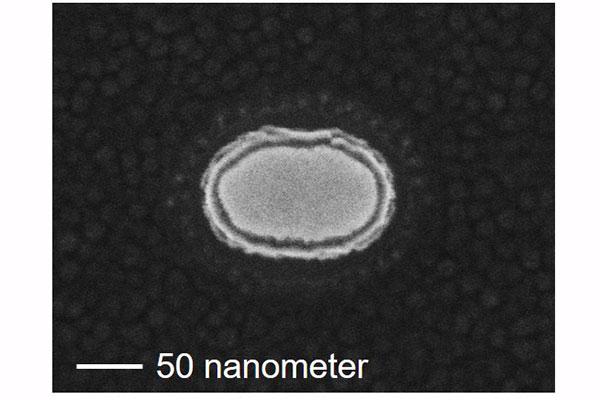
Credit: K. Hayakawa et al.
Tohoku University researchers have, for the first time, developed the technology for the nanosecond operation of the spintronics-based probabilistic bit (p-bit) – dubbed the poor man’s quantum bit (q-bit).
The late physicist R.P. Feynman envisioned a probabilistic computer: a computer that is capable of dealing with probabilities at scale to enable efficient computing.
“Using spintronics, our latest technology made the first step in realizing Feynman’s vision,” said Shun Kanai, professor at the Research Institute of Electrical Communication at Tohoku University and lead author of the study.
Magnetic tunnel junctions (MTJs) are the key component of non-volatile memory or MRAM, a mass produced memory technology that uses magnetization to store information. There, thermal fluctuation typically poses a threat to the stable storage of information.
P-bits, on the other hand, function with these thermal fluctuations in thermally unstable (stochastic) MTJs. Prior collaborative research between Tohoku University and Purdue University demonstrated a spintronics-based probabilistic computer at room temperature consisting of stochastic MTJs with millisecond-long relaxation times.
In order to make probabilistic computers a viable technology, it is necessary to develop stochastic MTJs with much shorter relaxation times which reduces the fluctuation timescale of the p-bit. Doing so would effectively increase the computation speed/accuracy.
The Tohoku University research group, comprising Kanai, professor Hideo Ohno (the current Tohoku University president), and professor Shunsuke Fukami, produced a nanoscale MTJ device with an in-plane magnetic easy axis (Fig. 1). The magnetization direction updates every 8 nanoseconds on average – 100 times faster than the previous world record (Fig 2).
The group explained the mechanism of this extremely short relaxation time by utilizing entropy – a physical quantity used to represent the stochasticity of systems that had previously not been considered for magnetization dynamics. Deriving a universal equation governing the entropy in magnetization dynamics, they discovered that the entropy rapidly increases in MTJs with in-plane easy axis with larger magnitudes of perpendicular magnetic anisotropy. The group intentionally employed an in-plane magnetic easy axis for achieving shorter relaxation times.
“The developed MTJ is compatible with current semiconductor back-end-of-line processes and shows substantial promise for the future realization of high-performance probabilistic computers,” added Kanai. “Our theoretical framework of magnetization dynamics including entropy also has broad scientific implication, ultimately showing the potential of spintronics to contribute to debatable issues in statistical physics.”
###
Media Contact
Shun Kanai
[email protected]
Original Source
https:/
Related Journal Article
http://dx.




